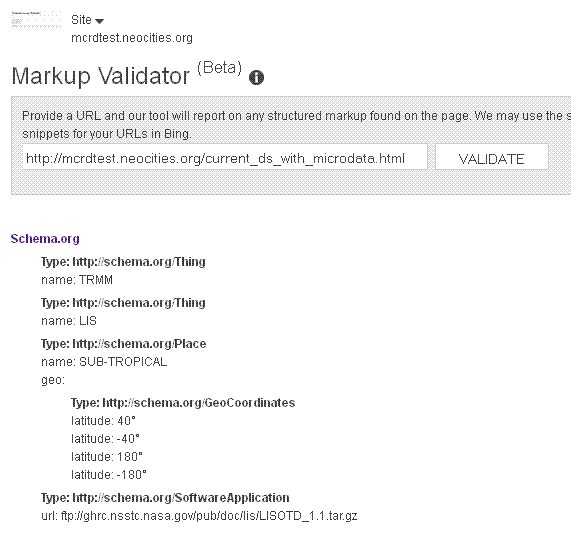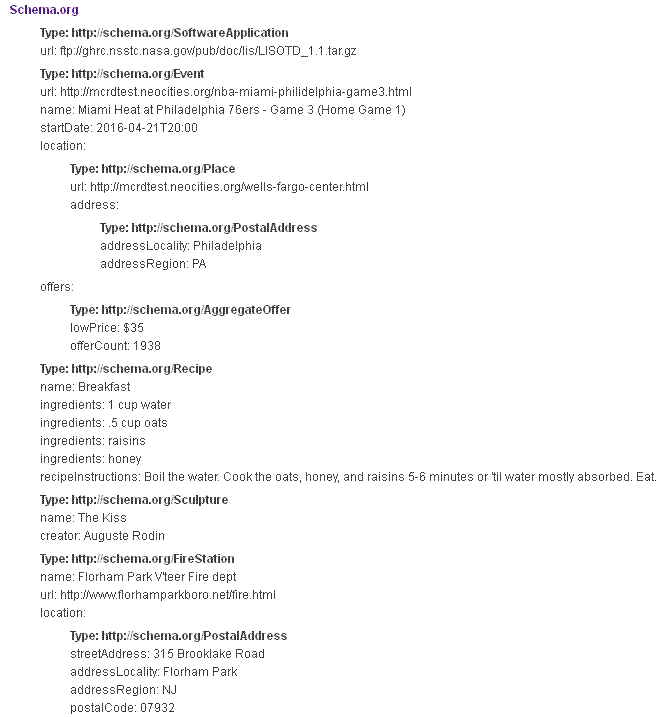Tools
- Check NON-json-ld markup with Google here
- Check JSON-LD markup ON SOURCE CODE with Google here
- Check NON-json-ld markup here with Linter
- Check any kind of markup here with Yandex
Problem with json-ld
Out of Yahoo, Bing, and Google, the only search engine that bothers to parse json-ld for search results right now is Google.
How do I know this? I took the example pages linked further down on this page
and signed into the
Bing Webmaster Tools to test them.
Here's what I got for the "schema-event-json-example.html" page:

Note the red box. This confirms to me that Bing only supports microdata and RDFa (and whatever Open Graph is).
Next I thought that maybe Bing would only see the json-ld structured data if we used
a more "normal" type of schema.org content type on it, so I gave it the URL of the
http://mcrdtest.neocities.org/schema-event-json-example.html page and got these results:

Yahoo's search is now powered by Bing, so if Bing won't pull structured data out of
json-ld format neither will Yahoo.
Conclusion: json-ld isn't the best choice if what you want are rich-snippet-type search results,
but it may be handy for internal use (depending on what you want to do).
Problem with dataset schema for rich snippets
Search engines don't actually pull out ALL of the info you mark up with schema.org. Instead
what they do is use "part" of that info for their rich snippet search results. Google is transparent
about what they do and don't use:



Just because a parser like Google's tools can SEE microdata doesn't garuntee it will
USE it for enhancing your rich snippet search results.
Other search engines (Bing) do not specify which schemas they do and do not pull out at all.
So what will search engines use from a dataset for rich snippets?
You can see below that we have some microdata-formatted pages. These are the ones I will use
for these results.
From the section above, we know what Google wants to use where schemas are concerned:
- People
- Events
- Reviews
- Products
- Recipes
- Breadcrumb Navigation
Using This Google Tool on our dataset microdata page I got this result
Using Bing tools on our dataset microdata page I got this result:

Note that several pieces of info are missing here: our keywords like HDF and lighting,
our DataCatalogs, our description, our image, our download link, even the name of the dataset!
How do we know it's not because my mark-up is riddled with errors?
We know because for that same page the Google Tool and the linter tool both
ID correct structured data.
What does this tell us then? It tells us Bing is only going to use
SOME of the structured data for potential rich-snippet canditates because it is
only interested in some of it.
To try and find out which kinds of schemas Bing likes, I made the
multi-schema page to try out multiple schemas
on one page and see which ones Bing did and didn't pick up on. Google TELLS us what it
uses for rich snippets but Bing does not.
Bing saw this:

You can see it STILL DID NOT SEE THE DATASET, though it did see "obscure" things like
a fire station and a scultpure. I chose those obscure things because like a dataset they
are also "Thing" descendants. Note that 'sculpture' is even on the save 'level'
as a dataset at schema.org.
Conclusion: Google's tool doesn't bother telling you specifically which of the
microdata results will be included/recognized by it as rich snippet candidates. Bing will
tell you because those are the only ones it identifies to you, but it makes you guess WHICH
schemas (Person, Dataset, etc) it'll use for those candidates.
TAKEAWAY MESSAGE: Using the Dataset schema will win us no prizes in the rich
snippet race. We need to find out what Amanda's group is doing and how they did it, since they
say their search results improved which seems to imply they are getting some kind of rich snippets.
Did they use "generic" schemas, like "Person"? How'd they do this?
Bonus points: Linter tries to "guess" at rich snippets,
but as Linter isn't the same as Google or Bing/Yahoo, guessing is all it can manage.
I'm also submitting this page to Google to have it crawled and indexed, and after
that we should be able to see how these example pages show up in "rich snippet search results".
Example structured data pages